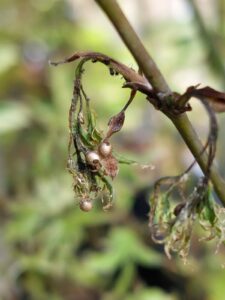How we care for our Acer's
Most crops can be infested with aphids.
Damage is caused in three ways:
- sucking plant sap when feeding
- excretion of honeydew leading to sooty mould
- some species can transmit plant viruses leading to distortion and disfigured plant growth.
Biological control with parasites, predators and fungal pathogens are available depending on crop and environmental conditions.
There are a large number of aphid species and identification can be important when parasitic wasps are to be used.
Depending on the species there can be alternate plant hosts. Winged forms develop under conditions of high density to migrate to alternate hosts.
Resistance to some insecticides is a serious issue with some species.
What we use to control them -
Aphiline C (Aphidius colemani) Vial of 500 Mummies/Adults
This tiny braconid wasp is particularly effective against round bodied aphid species, such as the melon or cotton aphid (Aphis gossypii), peach aphid (Myzus persicae) and tobacco aphid (Myzus nicotianae).
It is not effective against Macrosiphum species. It can control large populations of aphids, but will take time to achieve this and may leave many parasitised 'mummy' bodies on plants.
There is no need for concern if you see these on your plants, it is just how we care for our Acer's

How we care for our Acer's soil type:
Acer's do prefer Acidic soil, some thought it would be helpful to give you a few tips on soil.
Soil Types:
- Chalky Soils - very alkaline. Can be light or heavy
- Peat Soils - very high in organic matter and moisture
- Loams - mixtures of clay, sand and silt
- Silt Soils - Fertile, light and moisture retentive
- Sandy Soils - light, dry and low in nutrients - often acidic
- Clay Soils - heavy, high in nutrients. Bake dry in Summer and wet and cold in winter
It is important to improve the quality of soil as this helps give your plants all the nutrients necessary to establish themselves and grow.
If you do have doubts about the quality of the soil here are a few tips:
Sandy Soil: In order to thicken the consistency of the soil, it is a good idea to dig in some well rotted manure.
If you do not have access to Manure then a good quality multi-purpose compost will also help.
We would suggest doing this in the Autumn/Winter months so your garden is ready for Spring.
High Acidic Soil: If your soil has an Acidic level below 6 then you can dig through some lime.
This will help neutralise the area but it is worth checking the levels over a period of time.
- 0-5 - Acidic Soil
- 6-8 - Neutral - ideal planting
- 8-9 - Alkaline
- 9-14 - Highly Alkaline
Heavy Clay soil: In order to breakdown the thick clay soil we would suggest digging through well-rotten manure.
If you do not have access to manure then a good quality multi-purpose compost will also help.
Adding a well-rotted manure or compost is a great winter job. This will help get the ground ready for Spring.
Contact Us.
We hope you have found our article on How we care for our Acer's.
Please feel to contact us if you would like further information regarding our Biological controls.




